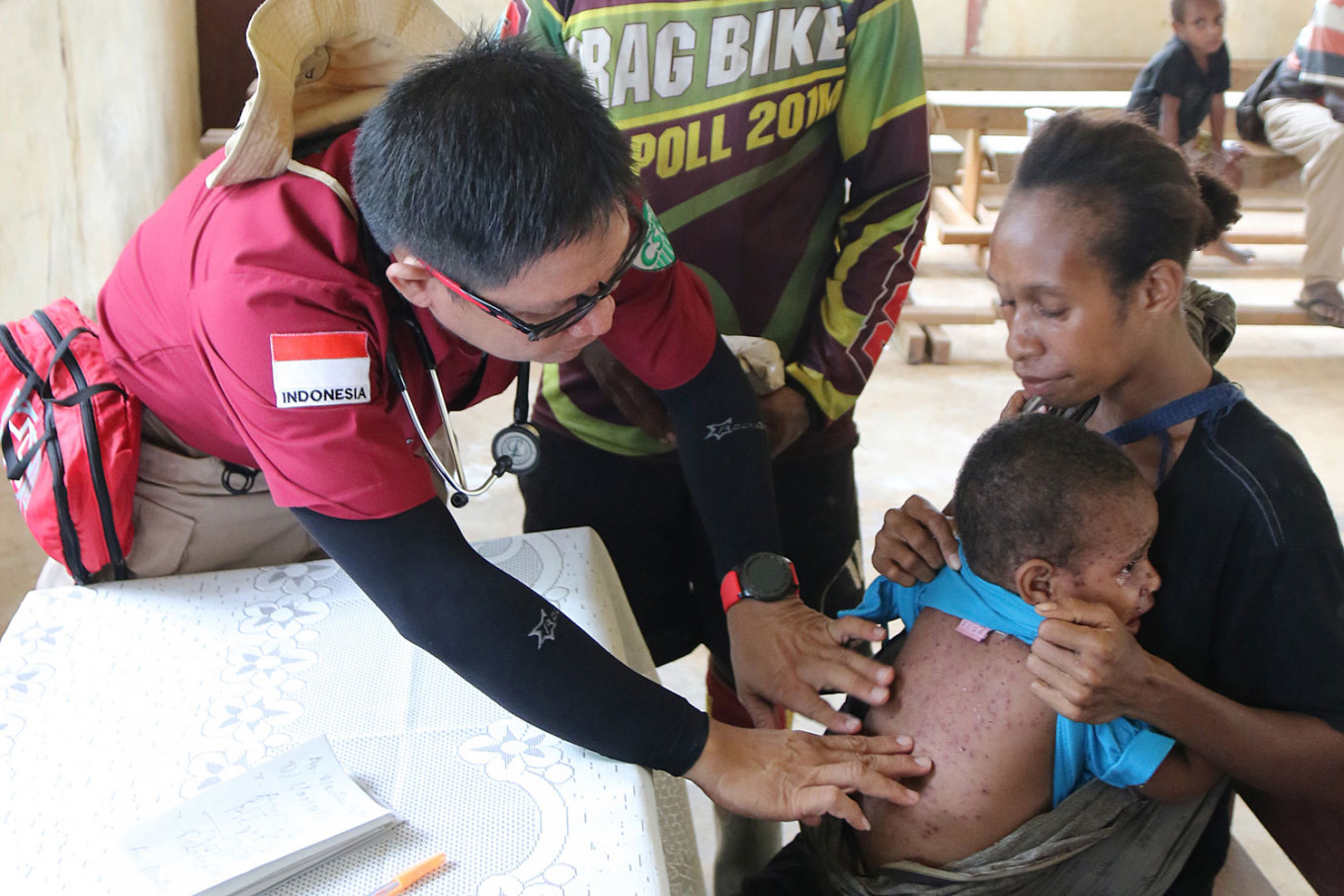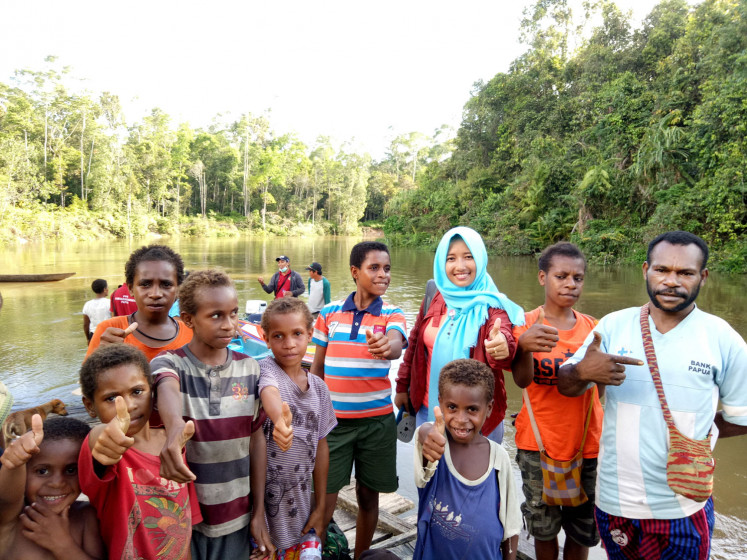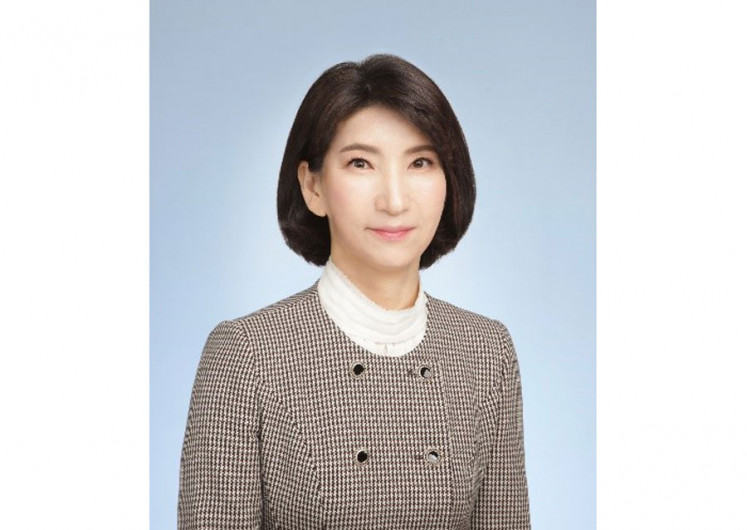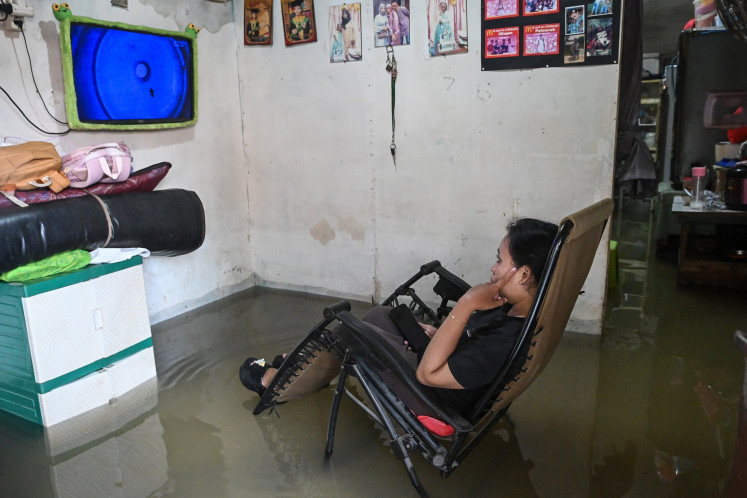Popular Reads
Top Results
Can't find what you're looking for?
View all search resultsPopular Reads
Top Results
Can't find what you're looking for?
View all search resultsGood health for all!
Change text size
Gift Premium Articles
to Anyone
“For nearly 30 years, I have often seen them die of nothing. I am sure this would not have happened if hospitals were near,” I recall someone say to me upon entering Papua.
In response to this very big issue, these Papuans replied: “we have the right to live a healthy life”.
My relationship with Papua began in October 2018, upon the request for consulting on hospital operations established by the Korea International Cooperation Agency (KOICA) and KORINDO Group. The hospital is located in Asiki village, Jair district, the Boven Digoel Regency, Papua.
KOICA is a cooperative development organization in Korea for realizing sustainable development and humanitarianism.
Meanwhile, the Korindo Group, with its headquarters in Jakarta, first expanded to Papua in 1993, after it had already established its plywood, paper and plantation businesses in the suburbs of Kalimantan and Jakarta.
In the early days of its entry into Papua, the company started its business based on the plywood factories, creating a huge number of jobs by operating oil farms as well. Among its various business areas, however, there were no healthcare facilities.
Despite that, they established one hospital there to improve the health and quality of life of the residents of Asiki.
Korindo Group’s joint business with the KOICA has ended, and the former will fully manage its business operations and the costs by 2025. Local government will bear the full operating expenses from 2030 and by then, the local government and Korindo Group will have shared the operational expenses as well.
What I wondered was “why is Korindo Group so passionate about running this hospital that brings no profit and will be dedicated to the local government in the future?”
Firman Jayawijaya, a doctor from the Asiki clinic answered my curiosity: "the purpose of hospitals is not just to treat sick people but also to act as a catalyst to protect human rights and the lives of residents so that they can stand on their own feet and live their own lives”.
After 36 hours of travel from Seoul, South Korea and in transit in Jakarta, I finally entered Asiki clinic in the middle of the forest and it was a modern building with basic medical facilities.
This went against the stereotype that companies will prioritize profits when they get involved with local businesses.
Papua, a place geographically left behind, is a place that needs a lot of help, especially in the health and medical sector.
According to the statistics of Boven Digoel Health Center in 2016, the infant mortality rate that year was 115 per 1,000 people and the neonatal mortality rate was 54 per 1,000 people during the same period, ranking first and seventh in all Indonesian provinces, respectively. The percentage of pregnant women visiting hospitals also stood at 22 percent, far below the Indonesian average of 87 percent.
Papua has traditionally been more dependent on traditional remedies than on modern medicine. The nearest hospital that can provide simple first aid in the Asiki region is a two-hour walk, and the only hospital that can accommodate severely ill patients and patients in need of first aid is more than six hours away.
For these various reasons, the situation in Papua's local health care system was not good, and a company that had been watching the situation for a long time provided a solution to the problem.
More than simply building a hospital and installing medical equipment to provide services to the community, Korindo Group is training local medical personnel, including doctors, pharmacists and nurses, to establish a framework for local health care in accordance with the Health Ministry's policy; the framework has also been well-maintained.
The Asiki Clinic, furthermore, is a primary care institution that focuses on changes in awareness and behavior. It has a maternity class for those who are reluctant to visit hospitals to enable a healthy pregnancy and childbirth through education on the importance of prenatal and postnatal examinations and safe childbirth.
It provides customized health education of chronic diseases such as high blood pressure and diabetes to high-risk residents, and regularly visits the valley villages and forest villages with no nearby hospital to provide vaccinations, medication, and other treatments.
The Indonesian government is trying to provide integrated primary health care as a part of its public health policy but it seems to lack the finances and manpower to cover geographically marginalized areas like Asiki village.
Thank you and goodbye: Residents of Kapoho village escort medical staff of the Asiki clinic in Papua as these medical workers head back to where they live upon delivering mobile medical treatment to the neighboring villageThe village was in the blind spot of primary healthcare facilities; therefore, its access to the healthcare services for local residents was limited. Under these circumstances, the Asiki clinic is contributing to the local health care system of local governments in a complementary manner by providing essential health and medical services to underprivileged local residents under the keynote of Indonesia's public health policy.
During the COVID-19 pandemic, the Korindo Group has also donated masks and protective clothing to the Papua community, which lacks medical and protective equipment, while asking them to pray for the safety of residents and medical staff.
Private companies are making such an invisible move to the community for the least human rights that Papua's neighbors should deserve.
Now I’m thinking again about the meaning of primary healthcare, with the memories of Papua embedded on my thoughts. In the Declaration of Alma Ata in 1978, we set our sights on achieving Health for All, yet we are still endeavoring to achieve that goal after more than 40 years. Many countries, including the Indonesian government, still seem far away from the goal, despite their constant efforts to achieve it.
But I believe that company like the Korindo Group, albeit having a business line that seemingly is unrelated to healthcare, has developed clinic Aski to achieve this goal and that the local unit's efforts to learn how to protect its health through this place will one day help it to achieve this goal of ensuring health of all.
Local government officials, clinic staff members and local residents whom I met to discuss the future operation of the clinic were all calling the Asiki clinic as "our clinic".
Just as this clinic belongs to the Asiki region, it will not be long before one day, “health has truly become ours” with various cooperation and efforts.
Even today, the Asiki clinic is still treating patients, providing health education, first aid to patients with severe diseases, taking them to higher-level hospitals, and checking on residents who are not visiting the clinic.
Meanwhile, the Korindo Group, like the patronizing eldest brother of the region who always keeps a strong guard, will always be involved in these efforts. The clinic is an excellent example of tripartite cooperation among the Korean government, Indonesian enterprises and Indonesian local governments.
From now on, the challenge for us is to find ways to maintain and manage the clinic in a sustainable manner, treating it like the community’s treasure.
To operate and manage the clinic in the current level, the minimum finances of medical personnel, medicine, and facility operating expenses must be secured. Various attempts are necessary to improve the clinic's profit structure so that it is steadily maintained even when the clinic is handed over to the local health authorities in the long term.
I believe we will overcome the difficulties if the efforts of the health authorities to protect the health rights of local residents and the efforts of the private company, Korindo Group, have met.
It has been two years since I went there, and I still remember the gratitude of the residents and the pride of the clinic staff. I hope that in the long years ahead, the clinic will remain the residents’ go-to place anytime they need to solve their health problems. Health for all the people of Papua!
Myong-sun Cho, a Ph.D in Health Science from Ewha Woman’s University, is a professor of Vision College of Jeonju, South Korea, who was previously a visiting professor to Ewha Woman’s University from 2017 to 2020. Previously, she served as an Official Development Assistance (ODA) expert with Korea International Cooperation Agency (2012-2017), following a five-year stint as director at Korea Foundation for International Healthcare (2008-2012)











